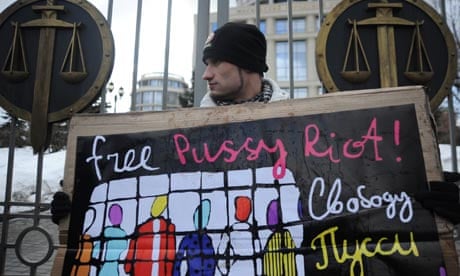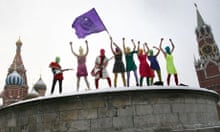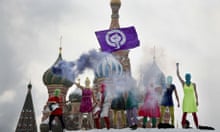Amnesty International has called for the members of the Russian punk band Pussy Riot, jailed last month for their protest against Vladimir Putin, to be released immediately. The human rights organisation said Maria Alekhina, Nadezhda Tolokonnikova and Ekaterina Samusevich were "prisoners of conscience" and accused the Russian government of punishing them for the "broader political context" of their actions, rather than the actions themselves.
Alekhina, Tolokonnikova and Samusevich have all admitted to being members of Pussy Riot, the balaclava-clad band who mounted guerrilla performances across Moscow this spring. On 21 February, just before Putin won the presidential election, the group staged its most audacious gig: a five-minute concert inside Christ the Saviour cathedral in Moscow. Their "punk prayer" called on the Virgin Mary to "chase Putin out". Less than two weeks later, the three women were arrested and charged under article 213 of the Russian criminal code, under which they could face seven years' imprisonment. The musicians have now been held without trial for almost a month. No hearing is scheduled until 21 April.
"Even if the three arrested women did take part in the protest," Amnesty said on Thursday, "the severity of the response of the Russian authorities – the detention on the serious criminal charge of hooliganism – would not be a justifiable response to the peaceful – if, to many, offensive – expression of their political beliefs.
"The activists left the Cathedral when requested to do so and caused no damage," Amnesty's statement continued. "The entire action lasted only a few minutes and caused only minimal disruption to those using the cathedral … Instead of prosecuting members of Pussy Riot for their political opinions criticising the Russian government and some Church officials, the Russian authorities must recognise that their protest is protected by the right to freedom of expression, guaranteed in international human rights law."
Although members of the Russian Orthodox Church initially called for leniency in the case, Patriarch Kirill later accused the performers of doing the work of the devil. On Sunday, Estonian president Toomas Hendrik Ilves attended a concert in Tallinn in support of Pussy Riot. While Ilves criticised the band for "choosing the church as a site for political protest", he called the Russian response "disproportionate". "The history of artistic self-expression can be viewed in terms of a conflict between power and the spirit," he said. "Through power's reaction to the provocations of the spirit, we can measure the freedom of a society."
Supporters of Pussy Riot have organised two forthcoming international action days, on 15 and 21 April.






Comments (…)
Sign in or create your Guardian account to join the discussion